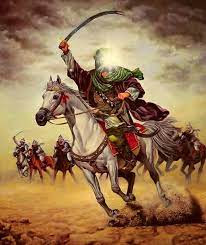Imam Hussain a.s |Prophets Grand Son|
Imam Husayn ibn Ali, the grandson of Prophet Muhammad, occupies a central and revered place in Islamic history and conscience. Born in 626 CE in Medina, he is a figure of immense significance, particularly for Shia Muslims. The story of Imam Husayn is intricately woven with themes of sacrifice, courage, and unwavering commitment to justice, making him an enduring symbol of resistance against oppression.
Imam Husayn's life unfolded during a critical period in Islam, marked by political turbulence and a struggle for leadership. His father, Imam Ali, became the fourth Caliph after the assassination of Caliph Uthman ibn Affan. However, Imam Ali's leadership faced challenges and internal strife, culminating in the contentious Battle of Siffin. After Imam Ali's assassination in 661 CE, the caliphate passed to Muawiya I, the founder of the Umayyad Caliphate.
The culmination of this political turmoil occurred during the caliphate of Yazid I, the son of Muawiya I. Yazid's rule was marked by corruption and a departure from the ethical principles of Islam. In 680 CE, Imam Husayn, in a profound act of resistance, chose to stand against Yazid's tyrannical rule, leading to the tragic events of the Battle of Karbala.
The Battle of Karbala, fought on the 10th day of the Islamic month of Muharram, known as Ashura, is a pivotal moment in Islamic history. Imam Husayn, along with a small group of family members and supporters, confronted Yazid's much larger army. Despite being vastly outnumbered, Imam Husayn refused to pledge allegiance to Yazid, choosing instead to uphold the principles of justice and resist oppression.
The tragic narrative of Karbala unfolds as Imam Husayn, along with his companions and family, faced severe deprivation, including thirst and hunger, in the scorching desert. On the day of Ashura, the battle reached its climax. Imam Husayn, standing valiantly against the forces of Yazid, was eventually martyred in the brutal conflict. His family members, including his infant son Ali al-Asghar, and loyal companions also faced martyrdom in the face of overwhelming odds.
The martyrdom of Imam Husayn is commemorated annually by millions of Shia Muslims during the month of Muharram, particularly on the day of Ashura. The rituals include mourning processions, majalis (gatherings to remember and mourn), and reenactments of the events at Karbala. These rituals serve as a powerful reminder of the sacrifice made by Imam Husayn and his followers for the principles of justice, truth, and resistance against tyranny.
The tragedy of Karbala holds profound spiritual and ethical significance. It is not merely a historical event but a timeless symbol of resistance against oppression, the defense of truth, and the sanctity of standing against injustice. The lessons derived from Imam Husayn's stand extend beyond religious boundaries, inspiring people of various faiths and backgrounds.
Imam Husayn's legacy is encapsulated in his famous words: "I have taken this stand not out of arrogance or pride, neither out of mischief or injustice. I have risen to seek reform in the community of my grandfather. I would like to bid good, forbid evil, and follow the traditions of my grandfather and my father, Ali ibn Abi Talib." These words reflect his commitment to upholding the ethical and moral teachings of Islam.
The tragedy of Karbala also underscores the universal values of justice, compassion, and resistance against tyranny. Imam Husayn's stance against oppression serves as an eternal reminder that individuals have a moral duty to resist injustice, even in the face of overwhelming odds.
Imam Husayn's impact extends far beyond the confines of religious rituals. His story has inspired countless poets, writers, and thinkers, and his principles continue to resonate with individuals advocating for justice and human rights. The lessons of Karbala are invoked in diverse struggles for freedom and equality around the world.
In conclusion, Imam Husayn's life and sacrifice at Karbala constitute a profound chapter in Islamic history and a timeless source of inspiration. His unwavering commitment to justice and truth, even in the face of imminent martyrdom, has left an indelible mark on the collective conscience of humanity. The annual commemorations of Ashura serve as a testament to the enduring legacy of Imam Husayn, reminding people of all backgrounds to stand against injustice and tyranny in the pursuit of a more just and compassionate world.




Comments
Post a Comment